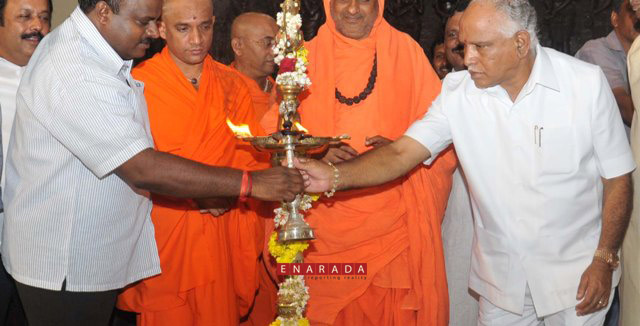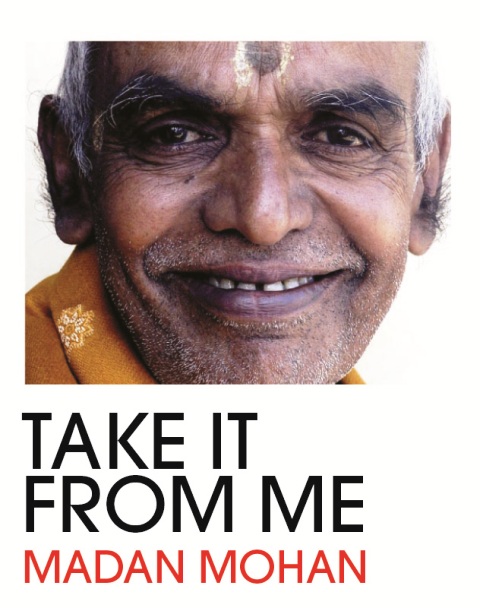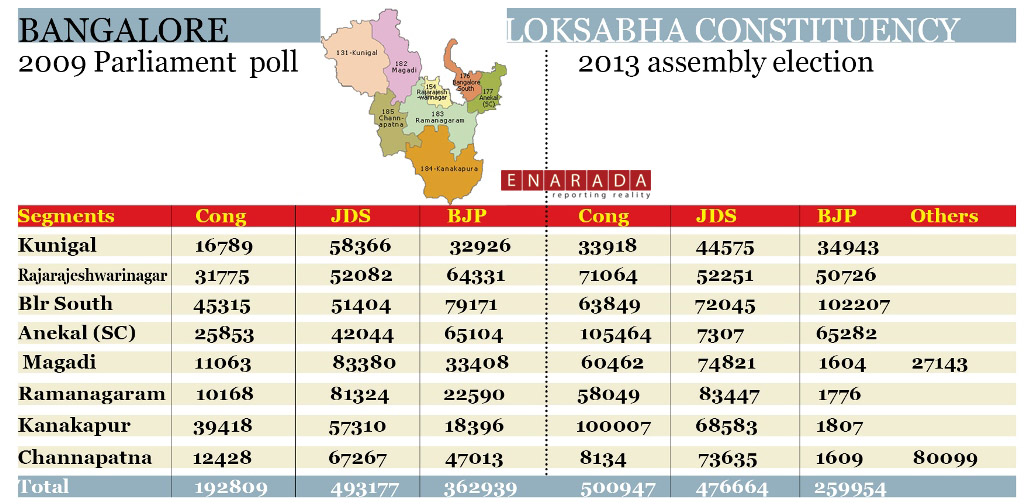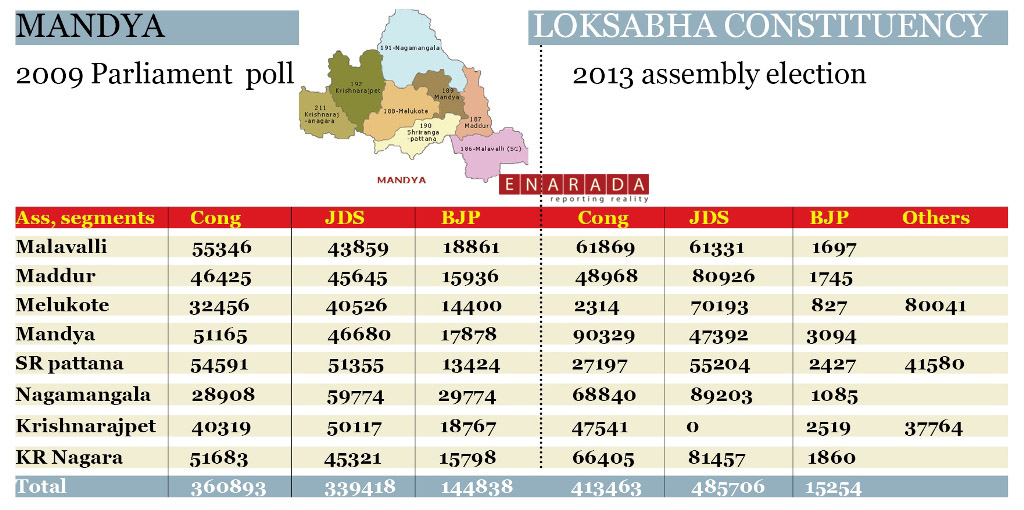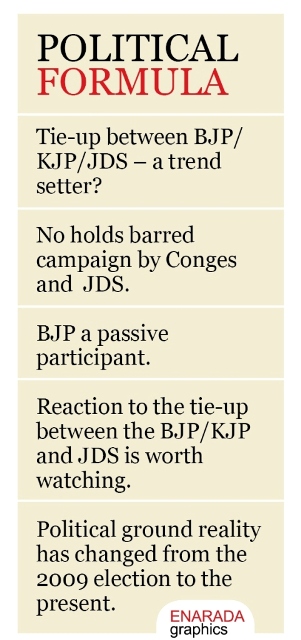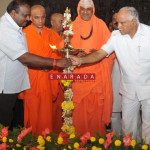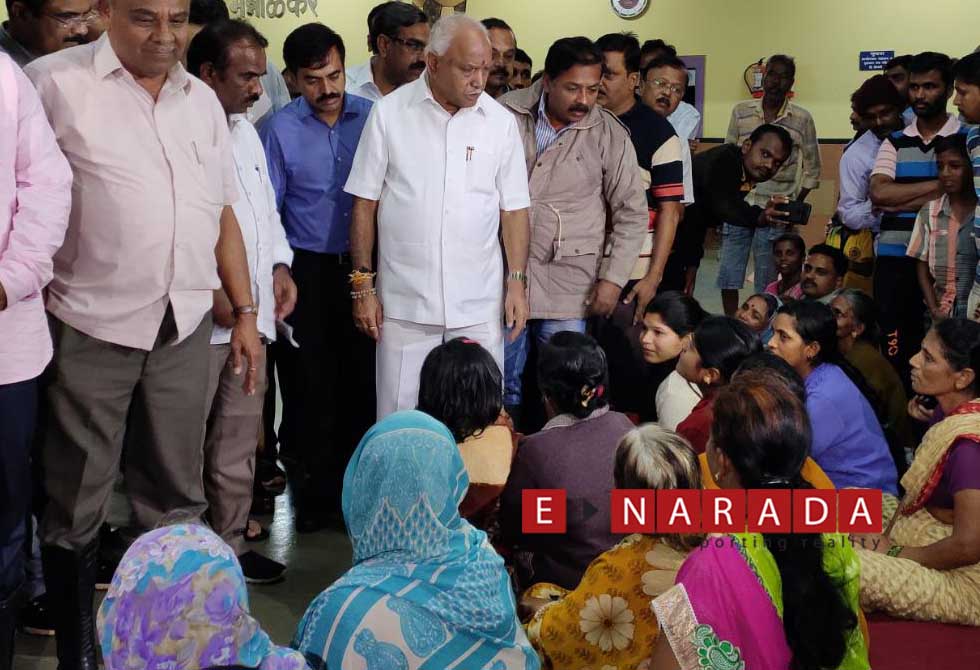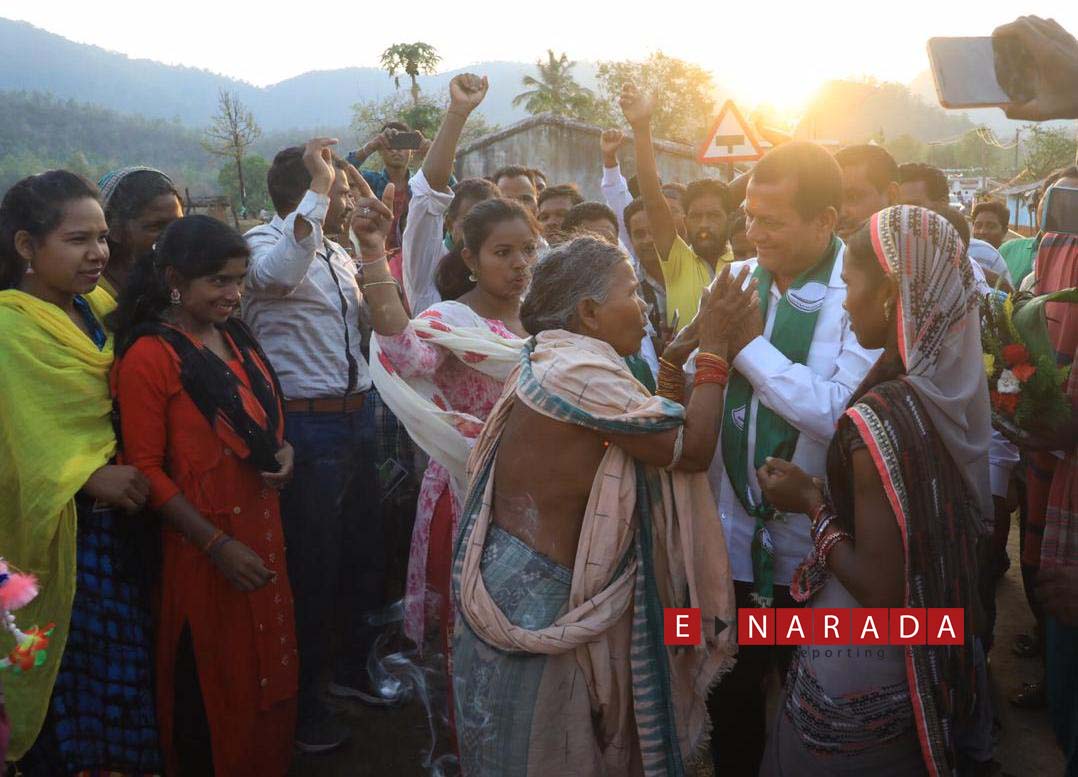ENARADA,Bangalore:
By Mathihalli Madan Mohan
The bye elections to the loksabha seats from Mandya and Bangalore Rural is more seen as a barometer to test the voters reaction to the attempts being made to forge a broad Anti Congress front in Karnataka than anything else.
Being held in the lame duck period of the loksabha’s present tenure which ends sometime in the first half of next year, the outcome of the poll, on whether or not the Congress and JDS retain the Mandya and the Bangalore Rural seats has hardly any significance at the national level. Just for the sake of meeting a constitutional formality, the elections are being held and the parties are fighting it out as a consequence.
What is however under test is the trial balloon of broader understanding floated by the BJP/KJP and the JDS. The understanding between the parties is at informal level and may get the formal state depending on the reaction of the voters in the by-elections being held as a run up to the fresh poll to loksabha slated in the first half of next year, if not held earlier too.
The just held assembly elections have once again reiterated a point which has been fact of the political life of Karnataka, that Congress wins or loses elections depending whether the opposition votes are consolidated or divided. It was this single factor, which prompted the formation of the Janata Dal in eighties and in the nineties, the understanding with BJP, which had grown in strength by that time, even as one of the factions of the Janata Dal had moved out. Congress lost the 1983, 1985,1994 assembly elections, before the BJP could win on its own stream in 2008. In 2004, Congress party failed to retain power, leading to the emergence of a coalition era. And the Congress hold in the parliament elections also got gradually weakened, with its victory being counted in single digits in the last two loksabha polls.
In the 2013 assembly elections, the Congress could poll 36.55% of the votes, while the four anti Congress outfits, namely the JDS, the BJP. KJP, the BSR Congress, shared more than 67% of the polled votes. Perhaps it is this political reality, which obviously brought about some sort of rethinking on the part of the anti-Congress parties to think of forging a broad Anti Congress front to give one to one fight in the forthcoming loksabha polls, where Congress faces a problem, finding itself drawn into the vortex of the scams, the latest one revolving around Mr. Robert Vadra the son in law of the first family of the Congress.
Call it by name, understanding or alliance, formal or informal, opportunistic or otherwise, this arrangement for consolidating the anti-Congress votes, on the eve of bye elections to loksabha, is quite formidable going by sheer political arithmetic and also from point of electoral strategy.
The move is both expected and unexpected.The coming together of the BJP and KJP was on the cards ever since the voting pattern in the assembly elections revealed that both of them a sizeable force to be reckoned notwithstanding their fratricidal quarrel and being committed votes, their reunion would make them as force as powerful as Congress. Even before the modalities of the merger or alliance could be worked out with particular reference to the future role of Mr. Yeddyurappa in the new dispensation, the two parties have come together for the loksabha and three bye elections to Karnataka Legislative Council. For sheer political survival it is imperative that they should jell together. Otherwise, they find it difficult and highly impossible to regain power singly. So the reunion between them was expected.
The unexpected however has been the desire of the JDS to pitch in with a bid to revive the understanding, as a result of which they had kept the Congress at bay in the latter half of 2004-2008 period, Right from the beginning till they parted company, with a history of mutual recrimination and a bitter feud, it was a relation where the trust was totally missing. There was absolutely no hint of the parleys held if any to bring about the denouement.
The only fly in the ointment has been the credibility such a political tie-up may carry with the voters has a whole. It has been known that the there was no meeting of minds between the JDS and BJP even at the best of times and that the acrimony that marked the relations between the BJP and the KJP is too recent to be erased from the memory.
If this arrangement holds on till the next loksabha elections, due in a couple of months, the Congress is in trouble. And the calculations of the Congress High command of getting substantial number of seats from Karnataka are definitely going to be awry and the Non Congress front/fronts may find themselves in a happier position.
However its impact on the poll on Wednesday’s bye election, from the loksabha constituencies of Mandya and Bangalore Rural, is going to be limited. The fight in these constituencies is essentially between Congress and Bangalore Rural and can reach the destination on their own without the help of the BJP, which is too weak to tilt the balance in one way or the other.
In 2009 loksabha poll, Bangalore Rural witnessed a tussle of supremacy between JDS and BJP, with Congress ran as a poor third, and in Mandya, the contest was between Congress and JDS, with the BJP being pushed to third position. While Mr.Kumaraswamy, the former Chief Minister and currently the state president could assert with an emphatic victory margin 1.31 lakhs, Mr. Ambarish the Kannada film star could fetch a victory with a measly margin of just 21,000 votes. What can be made out from the contest has been that the while JDS had strong roots in both constituencies, the Congress and BJP, facing fluctuations in their vote bases, occupying third place alternately.
However a different picture of political balance emerged in 2013 assembly elections. In Bangalore rural parliamentary segments the Congress came back with a vengeance to move from the third place to top place, bagging a whopping 5.00 lakh votes against 1.92 lakhs it had polled in the parliament poll. The JDS however held on its own base, suffering slight erosion to polling 4.76 lakhs votes as against 4.93 lakhs votes it had secured in parliament poll. However, it was the BJP which faced a disaster, losing more than one lakh votes which it had got in the parliament and was placed third with just 2.59 lakh votes. It was obvious that while JDS remained steady, the Congress experienced a bonanza of sorts, getting more than one lakh votes from BJP, besides obviously getting the support of the newly enrolled voters.
The party which led in six of the eight assembly segments of Kunigal, Rajarajeshwari nagar, Magadi, Ramangaram, Kanakapur and Channapatna in the parliament poll, could retain only Kunigal and Ramnagaram. The Congress which had no lead any of the eight assembly segments in the parliament poll, etched out victory in Rajarajeshwari nagar, Anekal, Magadi and Kanakapur. BJP which had won from Bangalore South and Anekal, could retain Bangalore South and though its vote base remained almost intact, had lost Anekal. In Channapatna, JDS suffered loss despite the increase in the votes, and the seat went over to Karnataka Sarvodaya Paksha, which made hay at the cost of the Congress and BJP, which were virtually worsted in the assembly poll.
In Mandya, Congress which led in Malavalli, Maddur, Mandya, Shrirangapatna, and K R Nagar in the last parliament poll could retain only Malavalli, Mandya, santched win in K R Pet from JDS, and lost Maddur, Shrirangapatna and K R Nagar in the just concluded assembly election. The JDS on the other hand, which had a lead in Melkote, Nagamangala and K R Pet in parliament poll, lost all except Nagamangal and gained in Maddur, Shrirangapatna and K R Nagar in the assembly elections, and in addition, it had to yield Melkote to Mr. Yogeshwar of the Socialist Party. The tragedy of the BJP, which had no lead in any of the eight assembly constituencies, in the parliament poll, cut a poor show, with its vote base plummeting form 1.45 lakhs to a mere 15,000 between the parliament and the assembly elections.
The JDS has made the fight at Bangalore Rural where it had put up Mrs. Anita Kumaraswamy, wife of Mr. Kumaraswamy, the Congress has brought back Mr. D S Shivakumar, who was denied the berth in the cabinet because of the graft changes against him by giving the ticket to his brother, and conceding the leadership of party campaign to him. The Congress has been trying to woo Mr. Yogeshwar the former BJP Minister who after being denied the ticket by both the main line parties, went over to the Socialist party to assert and win the seat win the Channapatna seat. But Mr. Yogeshwar had demanded a berth in the cabinet in return, about which Congress has not made any public commitment as such.
In Mandya, the Congress has fielded a film Star Ramya, and Mr Ambarish, the Karnataka Minister has made it as prestige and personally leading the campaign, in the constituency, which has been his bailiwick for the past four parliament elections in a row. Efforts are being made both parties to bring the Karnataka Sarvodaya Paksha, which has won the solitary assembly seat to their fold.
The campaign in both of the constituency is marked by speech dipped in vitriol and trading of the personal charges against each other has become quite common.
The interesting point is whether the change in political equations noticed in the assembly poll would be reflected in the by-elections too or whether the last parliament’s poll pattern finds itself repeated. If the first option were to operate, the chances are that the Congress may cock a snook at the JDS in Bangalore Rural and the JDS may pay back in the same coin in Mandya. Otherwise, it would a status quo.
Incidentally one should not fail to discern, the subtle difference in the mandate that the parties get between the parliament and assembly elections. Between the two for a of elections, it is the parliament poll, correctly denotes the political base of the party, and remained immune from the local factors which cloud the assembly elections. The election watches have noted a significant fact, that the voters, who avoid the major political parties in the assembly elections, have a tendency to lean towards the mainline political parties. Going by the trends noticed in Karnataka, the JDS is susceptible to erosion in the parliament poll.
Under the circumstances, the reaction of the voters for the new tie-up holds more interest that the outcome of the bye election itself.
(Posted on August 20, 2013 @ 4.15pm)
(Author is a Senior Journalist and Columnist. Mobile: +91 94480 74872 Email : madan.mm@gmail.com)
The views expressed on the website are those of the Columnists/ Authors/Journalists / Correspondents and do not necessarily reflect the views of ENARADA.

